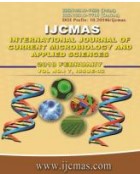


 National Academy of Agricultural Sciences (NAAS)
National Academy of Agricultural Sciences (NAAS)

|
PRINT ISSN : 2319-7692
Online ISSN : 2319-7706 Issues : 12 per year Publisher : Excellent Publishers Email : editorijcmas@gmail.com / submit@ijcmas.com Editor-in-chief: Dr.M.Prakash Index Copernicus ICV 2018: 95.39 NAAS RATING 2020: 5.38 |
The field experiment was conducted at the ‘Research farm’ of Division of Agronomy, Indian Agricultural Research Institute, New Delhi, during 2014-15 and 2015–16 to study the growth parameter, yield and economies in maize-wheat-mungbean cropping system as influenced by crop residue and potassium management. The experiment consisted of 15 treatment combinations with three treatments in crop residue [no crop residue, Crop residue incorporation and fungal consortium incorporation and five treatments in recommended dose of potassium (RDK) (K kg/ha), potassium management [control, KSB, recommended dose of potassium 60 kg K/ha, 50% RDK+ KSB and 75% RDK+ KSB]. The wheat was positively influenced by variable crop residue and potassium management at growth stages during both the years. Results revealed that significantly highest plant height, DMA, LAI, mean crop growth rate, net assimilation rate, of wheat were noticed with treatment receiving fungal consortium incorporation which was statistically at par with crop residue incorporation. Similar results were also recorded for grain yield, straw yield and significant interaction grain yield in during 2014–15 and 2015–16 years. Further evaluation of revealed significantly improved due to K management practices during both years of experimentation. Potassium management in wheat of results revealed that significantly highest plant height, DMA, LAI, Mean crop growth rate, net assimilation rate, yield attributes, grain yield, straw yield of wheat were noticed with treatment receiving 100% RDK+ KSB which were statistically at par with 75% RDK+ KSB.
 |
 |
 |
 |
 |